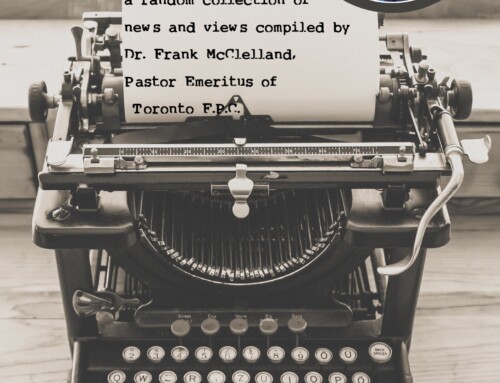GOD IS ON OUR SIDE
Ezekiel 35:3 contains the worst words God’s enemies can hear, “Behold, “I am against thee”. Chapter 36 has the very best words for the weak saint., “Behold, I am for you.”
These words are a reminder that God’s purposes will be opposed. All that is not of God is against us. The devil and the world are against us, and our own failings are against us. But God is for us. His Word is for us. God’s mighty power is for us and His sovereignty is invincible. He will carry out His own purpose. On this account Paul asks, “Who can be against us?” [Romans 8:31].
We are also reminded that God’s purposes will work to our ultimate advantage. Paul argues, “We know all things work together for good to them that love God, to them who are the called according to His purpose” [Romans 8: 28]. In Ezekiel 36 the prophet builds line upon line in obvious progression, “I will turn unto you,” “I will multiply men upon you,” “the wastes shall be builded.” [vv9: 10].
Best of all, the God of Israel promises, “I will settle you after your old estates, and will do better unto you than at your beginnings: and ye shall know that I am the Lord [v11]. The best is yet to be – all things working for good and His people as never before.
Finally, God’s purposes are related to His people, “For, Behold, I am for you.” The promise is irreversible. There is a message in this for Israel, too. The chapter is specifically addressed to them. God will bring His own people back to Himself. What a promise for the backslidden, the unworthy, the defeated the discouraged! There is victory in Christ. “Who shall lay anything to the charge of God’s elect?” [Rom. 8:35]. “Who shall separate us from the love of Christ?” [v35]. “In all these things we are more than conquerors through Him that loved us” [v37] [Dr. John Douglas]
* * * * * * * * * *
“In the resurrection morning, this, I believe will surprise us most: that we did not love Christ more before we died. “ [J.C. Ryle].
“It is not great talents that God blesses, so much as great likeness to Jesus. [Robert Murray McCheyne].
“When Christ comes again, the remains of ignorance will be rolled away.” [J.C. Ryle].
THE SINLESSS LAMB
Before the Passover night, the Israelites were to select a lamb and make sure it had no spot or blemish. It pictured the sinlessness of Jesus, the “Lamb of God.” [John 1:29].
Three particular parts of the Passover lamb were mentioned [Exodus 12:9]. The “Head” symbolizes the Mind. Paul the apostle, known for his intellect, wrote of Christ that “He knew no sin” [2 Cor. 5:21]. The Purtenance, or insides, was considered to be the seat of emotions. John, who was known for his sensitivity, wrote, “In Him is no sin” [1 John 3:5]. The Legs symbolize action. Peter, who was characterized by action, wrote of the Saviour that He “Did no sin” [1 Peter 2:22]. [Rev. Ron Johnston]
FOUR GRAPHIC PICTURES IN PSALM 107
This Psalm has two sets of repetitive statements. There is the Cry of the People [6,13,19 & 28], and there is the Call to Praise [v8, 15, 21, & 31]. They divide four different views of the same subject – The Sinner. Read each section carefully to see how the sinner comes to peace in Christ, and how the whole Psalm parallels our own spiritual experience.
THE TRAVELLER LOST IN THE DESERT [v4-9].
He is “hungry,” “thirsty,” and “solitary in the wilderness.” When he realized his great need “he cried unto the Lord.” The Lord “delivered” him, causing him to “praise God for his goodness” and “wonderful works” to him.
THE PRISONER HELD IN BONDAGE [v10-16].
He sits bound and fettered, in darkness, awaiting execution. Again, when he realized his sore plight “he cried unto the Lord.” He too was “delivered” from the strictures of the prison and began to praise the Lord.
THE PATIENT SUFFERING IN ILLNESS [v17-22].
He is here “afflicted.” He is so ill he cannot eat and he realizes that death lingers nearby. An understanding of his terrible plight leads him to cry “unto the Lord.” The Lord sent a healing word and this forms praise in his once abject heart.
THE SAILOR TOSSED IN THE STORM [23-32].
The last vivid picture shows the sinful man as a mariner. The sea is so rough that he reels as a drunken man and is at “his wit’s end.” In his extremity he does the right thing, he calls “unto the Lord in (his) trouble.” The Lord hears, calms the storm, and immediately the song of praise begins.

